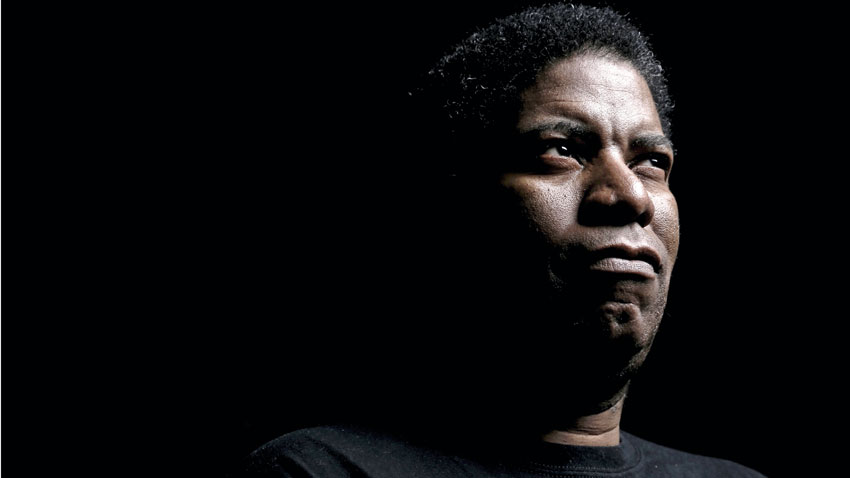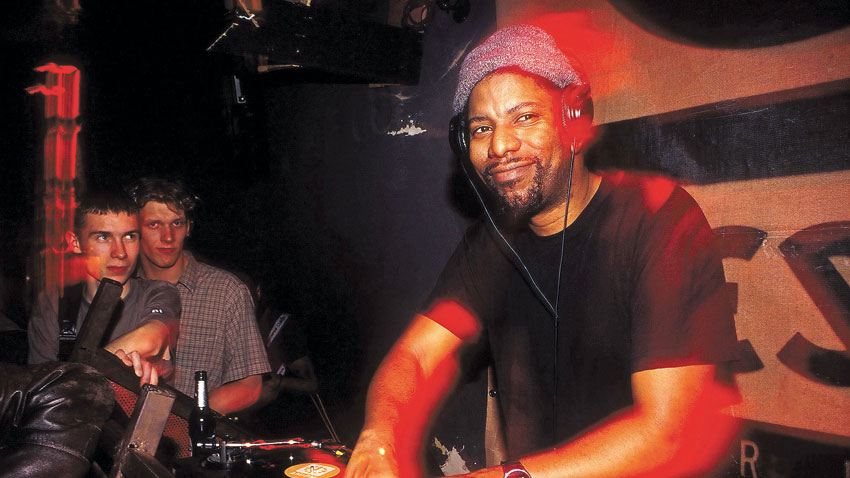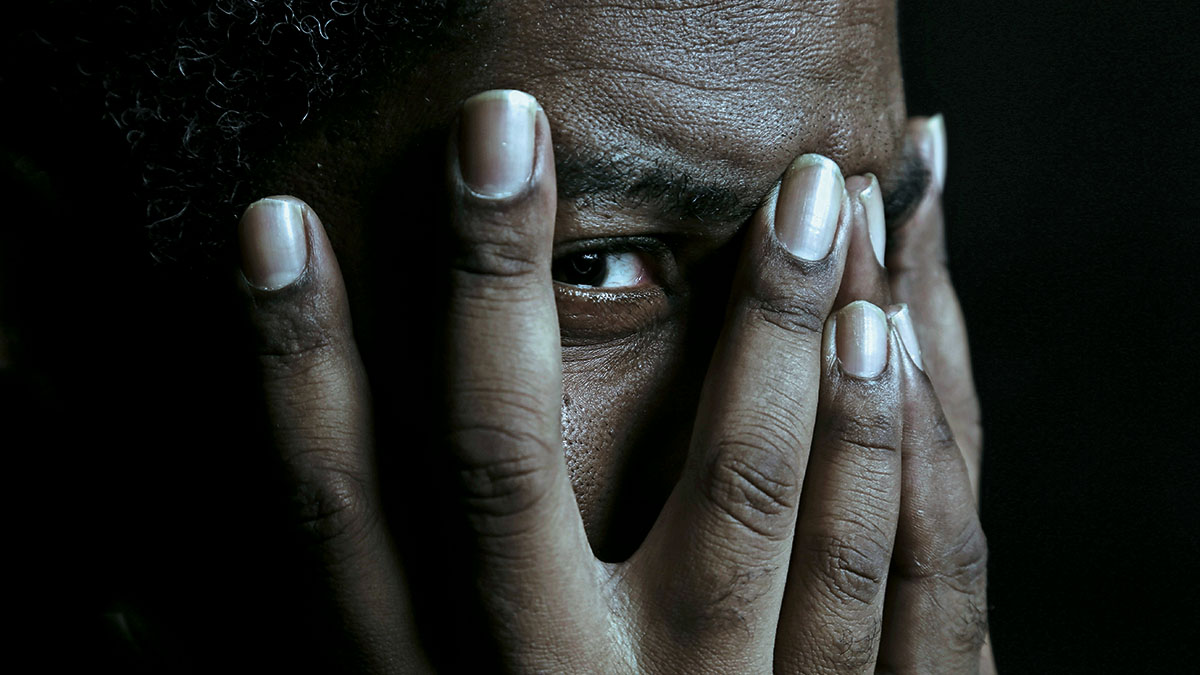Marshall Jefferson on making music then and now, and why he'd rather work alone.
The Chicago-born DJ/producer and one of the founding fathers of house, is now based in Manchester and running a new label

Marshall Jefferson sits amongst a select group of producers, numbering in the single digits, who can truly lay claim to being founding fathers of dance music as we know it.
Starting his career as a DJ in Chicago in the early 80s, Jefferson quickly graduated to producing and releasing records of his own, as well as taking on an active role behind the scenes of the influential label Trax. He would go on to have a hand in several of house music's seminal tracks: his release Move Your Body (House Music Anthem) invented the sequenced house piano sound. Under the moniker Virgo, meanwhile, Jefferson can lay claim to production credits on two of the earliest acid house records - Sleezy D's I've Lost Control and Phuture's Acid Tracks. Later, as the man behind the boards for R&B/deep house outfit Ten City, Jefferson created some of the genre's first crossover hits.
Now firmly planted as a resident of the UK - having moved here in the early 90s - Jefferson is as active in the house music scene as ever. Alongside a steady stream of DJ dates and production credits, just last year he launched a new label, Freakin909, alongside House Of Virus and DJ Ides, through which he released his latest track, Kiss Off The Dragon, just last month.
We caught up with Marshall to find out about his formative days as a producer and how his approach to making and playing house music has changed over the past three decades.
What was your first introduction to music making?
"I was a DJ before I started making music, and I bought this record in a record store by Jesse Saunders, who was a DJ we all knew. I was likem 'Man, I want to make records like that to get a whole bunch of girls'. That's what put the thought in my head, but it was just fate.
"A friend of mine, he was a guitarist and he needed a ride to this music store called Guitar Center. When we got there, the salesman was trying to sell this new piece of gear, a sequencer, the Yamaha QX1. That was before we ever started making music on computers, and that salesman told us, 'With this, you can play keyboards like Stevie Wonder, even if you don't know how to play'. That was right up my alley, I was like, 'Wow!'. My friend thought it was bullshit - he said you've got to practise and take lessons - but I believed this guy, so I decided to buy it. I asked how much it was and the guy told me it was $3000. I didn't have that sort of money, but he asked me where I worked, and I told him I was at the Post Office. That was before they had email and stuff, so the Post Office was a great job back then. The store clerk gave me a $10,000 credit line.
Get the MusicRadar Newsletter
Want all the hottest music and gear news, reviews, deals, features and more, direct to your inbox? Sign up here.
"I got the QX1 and was all set to go; then he said, 'Wait a minute, it sequences keyboards; if you don't have a keyboard, you can't play anything'. So I got a keyboard too. Then he said, 'Hey, you don't want to have a keyboard and not have a drum machine, do you?'. So I got a drum machine. Then he said, 'Well you can't have a keyboard and a drum machine but not have a mixer so you can hear it all too'. So I got the mixer too. Then he told me, 'Well you're going to need something to record that all with too'. So I got a four-track recorder. Then I bought a keyboard module and another drum machine. Then there was this last thing he was trying to get rid of - it was a TB-303. He was like, 'It'll do basslines for you', and I was like, 'Wow, yeah! I'm a DJ, I want to do basslines'. It cost $150. I guess they weren't selling too well because he really pushed it on me.
"I got all this stuff home, and in the meantime my friend was nice enough to tell all my other friends, and they all came over and took the piss out of me for five hours. I felt like I was about an inch tall after they got through with me. You don't know how black people take the piss in Chicago - it was horrifying.
"Anyway, I wrote my first song two days later, and then about a year after that I had Move Your Body out and DJs started hiring keyboard players and telling them to play like Marshall Jefferson."
Other than the TB-303, what were those first synths and drum machines that you bought?
"I had a Roland JX-8P keyboard, a Korg EX-800 module, a Roland TR-707 drum machine. I also had a Roland TR-808, which I later loaned to Mike Dunn, Hugo Hutchinson and Tyree Cooper, and they made their first records with that drum machine. Then the mixer was a Boss mixer, I forget the model number; and I had a Tascam PortaOne Studio four-track recorder. Then I had the Yamaha QX1 and the TB-303. I think that was it - my first pack of gear."
Did you stick with that same set-up for a few years?
"I made music on all of that stuff until 1987, when Sterling Void robbed my house. He sold the 707 to Bam Bam, and that's how me and Bam Bam got close. Anyway, in the process this 707 got broke somehow, so Bam went back to Sterling Void and said, 'Hey man, this drum machine's broken'. Sterling just took it back and sold it to somebody else."
"With the QX-1, after a while, I knew exactly how much to lengthen each note to make it sound natural when I sped it up."
So, are we right in thinking that you recorded some piano or synth parts by playing them at a slower bpm and then speeding them up?
"Back then, I was recording probably at about 40 or 50bpm maximum, and then I'd play it back at 120bpm. With the QX-1, after a while, I knew exactly how much to lengthen each note to make it sound natural when I sped it up. If you just speed up the playing, it's not going to sound natural, it would sound all choppy. You'd lengthen the notes, and I'd know exactly how much to lengthen them, so I'd just go back and edit all the notes so it came out nice and full."
Tell us about your involvement with the release of Phuture's Acid Tracks.
"Ron Hardy gave me a tape by Phuture, called Acid Tracks. It was great, it sounded kind of like [Sleezy D's] I've Lost Control. I called up [Phuture member] DJ Pierre and said that it was just the sound I was trying to find to put out on Trax. I brought the track to [Trax owner] Larry Sherman, and he said, 'Okay, I'll put this out if you mix it and produce it'. So I took the Phuture guys - Pierre, Spank and Herb - to the studio, and they all knew exactly what to do. They knew exactly how to turn those knobs on the 303 to get it right every time."
What was the reception like when you played new sounds like those out for the first time?
"With I've Lost Control, it immediately had people stampeding up to the dancefloor at The Music Box. The original version had the scream like every eight bars, people on the dancefloor would just scream along with it, because they knew it was coming."

What was it like working with Ten City? We assume that was quite a big step up, from creating music on your own with machines to working with multiple musicians… Was it quite a challenge?
"I fell right into it after Move Your Body. It was basically the same sounds and stuff, but Byron was a more spectacular vocalist than Curtis McClain, who sang Move your Body. When I first met Byron, he was singing in the lower ranges. Byron is a big dude, and it was weird for a big dude to have so little power, so we were in the studio doing this song called I Can't Stay Awake, and Byron hit a high note and I heard his power. I said, 'Keep singing high B'. He did and that's when his power came out."
Looking back at your career, there seems to be a common theme of collaboration - with you working with other producers, DJs or vocalists. Do you find it important to bounce ideas off other artists?
"I actually don't like collaborating at all. I see the song finished before I even sit down at the keyboard and somebody else can kind of disrupt that - they add bits on there that I don't want. So the extent of my collaboration is either they leave me alone while I'm working or I leave them alone while they're working. As far as a back and forth thing goes, it's not happening."
What do you use to make music these days? Do you have a production setup of your own?
"Yeah, it's especially easy now everything is so compact, but really I've still got to have the analogue keyboards. I still use the Roland JX-8P, then I have a Yamaha FB-01, a Juno-106 and a SH-101, but that's it. Then for drums, I have the Native Instruments Maschine 2, and an Akai MPC Touch. Then I've got a Komplete Kontrol S49 keyboard."
Do you use many plugins?
"Well, I love plugins, but I don't use a lot of them for instruments. The plugins I use are mostly for effects processing."
What's your view on modern plugins vs the original hardware that inspired them?
"I've tried them but they don't stand up against the keyboards yet. I really wish they would, because I hate lugging these keyboards around, but they just can't hang yet."
How different do you think it is for producers who are just starting out today? Do you think modern gear has made the learning curve any easier?
"I don't know. It was kind of self-explanatory back then - you had a keyboard and you played the keys on it. I had it all sorted, like, two days after I bought it. With the computers now, I think it's the same learning curve. It wasn't any more difficult back then. You had to wait a little longer with the sequencers. You use a program like Logic Pro and it just shits all over the old QX-1. Also the quantise is much better than it used to be. I used to absolutely, positively refuse quantise, because on the QX-1 it was so bad. The computer quantise now is a lot better than it used to be, but it still isn't as funky as an Akai MPC or an SP-1200. But, you know, it's passable - it'll work. It's not like the QX-1 quantise that used to really stiffen up a track, so it's a lot better now."
"The computer quantise now is a lot better than it used to be, but it still isn't as funky as an Akai MPC or an SP-1200. But, you know, it's passable - it'll work."
Do you mostly make music at home or are you working in studios?
"I've been going to studios a lot lately. I've been working with Rhythm Masters at their studio and John Butler at SSR College in Manchester."
Let's talk about DJing. Are we right in thinking you don't hold vinyl in as high esteem as some DJs of your generation do?
"Oh hell no. I'm done trying to prove myself. At the end of the day it's the songs that you play."
What's in your DJ setup?
"It depends on what the clubs have, but usually that's a Pioneer mixer and CDJs and that's it."
How quick were you to adopt new DJing technologies when they first started appearing?
"I stuck with vinyl until about 2009, which was pretty late. The reason I stopped was because I realised I was ruining all my records going through baggage claim. They used to do runs of 20,000 copies but now labels just do runs of 100 or 200 copies, so if you scratch a record now, that's it forever.
"So now I use USB sticks. At first I was using CDs, and I didn't start using USB sticks until September last year, because I still had to have something physical. Last year, I finally started trusting the technology. I still don't trust computers - I see people all the time bringing computers to clubs and something buggy will happen and boom, that's them ruined for the night. But USB sticks on a Pioneer CDJ, I trust that now."
Is it just reliability that keeps you from DJing with software? Have you tried many DJ applications?
"Mostly trust. But I'd just feel like I was up there reading emails. From a performance standpoint, I don't like bringing a computer on stage. I don't like DJing with computers, period; I can't get into it."

So you're pretty much entirely USB based…
"I've done vinyl-only sets, but to do that I have to dig out my records from Chicago. I've got two rooms of storage over there with 80,000 records. I literally have to fly back over to Chicago to get the stuff out. When I started DJing, around 81, I used to buy two copies of everything. So from all those records, if I'm doing a vinyl-only set, depending how long it is, I'll get maybe 50 records. Any longer than two hours, I'll make it 100. So it's a hassle doing vinyl only sets."
Have you ripped most of those records to a digital format so you can still play them?
"Yeah. I bump them to digital. Most of the time I get them online now, though, and I'll remaster them myself. Some tracks you need to back off the bass a little for clarity reasons. I'll boost the level sometimes to make it a lot clearer than it usually would. I have to remaster a lot of the older tracks to be able to play them now."
Check out Marshall's new label, Freakin909, and Facebook Page.


Future Music is the number one magazine for today's producers. Packed with technique and technology we'll help you make great new music. All-access artist interviews, in-depth gear reviews, essential production tutorials and much more. Every marvellous monthly edition features reliable reviews of the latest and greatest hardware and software technology and techniques, unparalleled advice, in-depth interviews, sensational free samples and so much more to improve the experience and outcome of your music-making.
“I’m looking forward to breaking it in on stage”: Mustard will be headlining at Coachella tonight with a very exclusive Native Instruments Maschine MK3, and there’s custom yellow Kontrol S49 MIDI keyboard, too
“Turns out they weigh more than I thought... #tornthisway”: Mark Ronson injures himself trying to move a stage monitor










